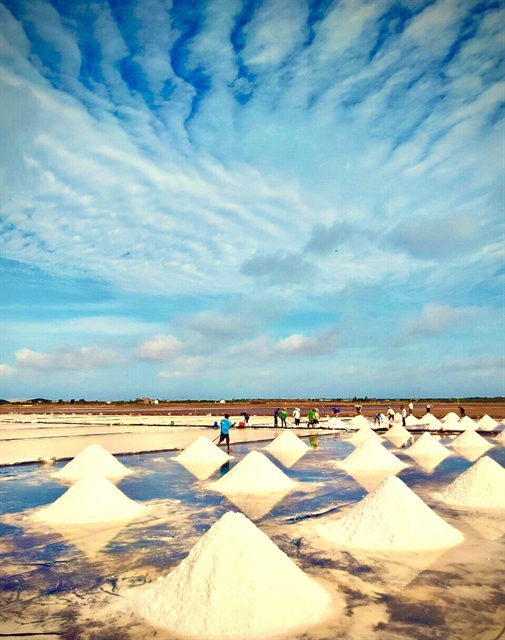
|
| Salt fields in Bạc Liêu Province’s Hoà Bình District. The province has taken various measures to preserve and foster the salt-making vocation. — VNA/VNS Photo Chanh Đa |
BẠC LIÊU — Bạc Liêu Province has been making efforts to increase the value of salt made locally by improving production infrastructure and promoting sales to improve the lives of farmers.
With a coastline of 56km and ideal weather, the Cửu Long (Mekong) Delta province has 1,500ha of salt fields, including 1,200ha in Đông Hải District. It has made salt for over 100 years, and its products are well-known nationwide for their deliciousness.
However, salt production faces difficulties such as more infrastructure, warehousing facilities, reliable outlets, and deep processing.
Trần Văn Thưa, chairman of the Doanh Điền Cooperative, which produces salt in Đông Hải District’s Điền Hải Commune, said besides being dependent on weather conditions, members also face an unstable pricing situation due to the lack of linkages between the stakeholders involved in its production and sale.
He said that without such linkages, the co-operative is compelled to sell to traders.
The profitability of breeding shrimps is high, prompting many salt farmers to switch to farming the crustacean, according to Thưa.
The salt fields in the province have thus reduced from more than 3,000 hectares in 2011 to 1,411 hectares last year.
Phạm Văn Thiều, chairman of the province People’s Committee, said besides shrimp and rice, salt-making is also a strength of the province’s agriculture.
He said investment in infrastructure for salt production is necessary.
In recent years, the province has implemented various policies and measures to invest in infrastructure and sustain the salt-making occupation.
The People’s Committee has approved a project aimed at improving the value of salt production and processing to be carried out from 2021 to 2030. Under the project, the province aims to maintain its salt-making areas at about 1,600ha, investing in infrastructure and incorporating advanced technologies.
The goal is to increase yields by 20 per cent and value by 30 per cent by 2030.
The Ministry of Agriculture and Rural Development has granted the province VNĐ130 billion (US$5.3 million) to invest in infrastructure for salt production, encouraging farmers to preserve the occupation.
The province is expected to organise the 2024 Salt Festival in April next year to honour and encourage farmers. In the past, it has organised various events to promote its salt products, including “Space of culinary quintessence of Bạc Liêu’s shrimp and salt” in November 2022.
It produces various salt products, including iodised, shrimp, chilli, pepper, and vegetarian salts, many of which have been recognised under the national “One Commune – One Product” programme.
These products are sold nationwide and exported to markets with high-quality requirements, such as South Korea and Japan.
Farmers produce salt in the dry season between December and April, and their fields are among the province’s popular tourism destinations.
Đông Hải District is developing tourism services that allow visitors to experience salt production processes and produce more high-quality salt products.
Trần Tuấn Kiệt, chairman of its People’s Committee, said the district plans to develop salt production into a critical sector and invest in infrastructure for its development.
The province’s salt has received geographical indication status from the National Office of Intellectual Property, and its salt-making occupation has been recognised as a national intangible cultural heritage.
This year, according to its Department of Agriculture and Rural Development, the province produced more than 27,000 tonnes of salt, including 7,300 tonnes of clean salt produced using plastic sheets to cover field beds.
The plastic sheet method produces cleaner salt with a high yield of 37 tonnes per hectare per season, while the traditional production method only yields 17 tonnes.
Giang Út Đèo in Đông Hải District’s Điền Hải Commune said: “The price of salt made by using plastic sheets is higher than salt produced by the traditional method.
“The plastic sheet method [also] requires less labour than the traditional method.”
This year, the province has 767 households with 1,520 workers making salt. — VNS
- Reduce Hair Loss with PURA D’OR Gold Label Shampoo
- Castor Oil Has Made a “Huge” Difference With Hair and Brow Growth
- Excessive hair loss in men: Signs of illness that cannot be subjective
- Dịch Vụ SEO Website ở Los Angeles, CA: đưa trang web doanh nghiệp bạn lên top Google
- Nails Salon Sierra Madre
 VnExpress News The News Gateway of Vietnam
VnExpress News The News Gateway of Vietnam





